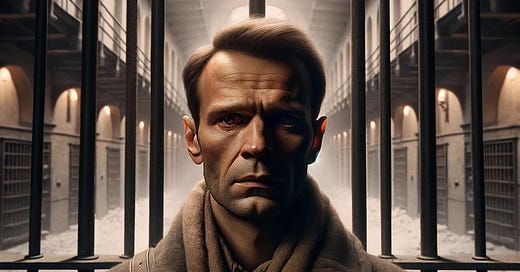Silenced Voice, Unsilenced Cause: Navalny's Enduring Fight
In a narrative twist befitting the darkest political thrillers, Alexei Navalny, the indefatigable crusader against corruption and a veritable David to Putin's Goliath, has reportedly succumbed to an enigmatic demise while in custody. Known for his bold stance and unwavering opposition to Vladimir Putin, Navalny's journey abruptly ended in the stark confines of a prison in the Yamalo-Nenets region of Russia. According to the prison service, after taking what seemed like an innocuous walk, Navalny fell ill, lost consciousness, and, despite the frantic efforts of summoned medical staff, could not be revived. The curtain falls on his life amid whispers of foul play, with the official cause of death shrouded in mystery and under investigation.
Navalny's saga is one of extraordinary resilience against a backdrop of political machinations and personal peril. Surviving poisoning attempts that would have felled lesser men, he emerged not weakened but emboldened, his voice amplified in defiance of the Kremlin's attempts to silence him. His activism was not just a thorn in Putin's side but a beacon for an anti-corruption movement that dared to challenge the iron-clad grip of a regime known for its ruthlessness.
Yet, Navalny's untimely departure from the world stage does more than cast a shadow over the Russian opposition; it sends ripples through the fabric of international politics. Western governments, once vocal critics of his treatment and advocates for his release, now stand at a crossroads, contemplating the imposition of sanctions that could further strain the already taut threads of diplomacy with Russia. This moment underscores the perilous path trodden by political dissidents in Russia, a stark reminder that opposing the Kremlin can be a deadly endeavor.
For those who stood shoulder to shoulder with Navalny, his death is a dual-edged sword—a tragic loss and a clarion call to action. It is as if, from the ashes of this tragedy, a phoenix of resistance must arise, more organized and determined than ever to pursue the ideals Navalny championed. Yet, in the immediate aftermath, there is a collective pause, a time for mourning, and a somber reflection on the daunting risks faced by those bold enough to stand against Putin's regime.
In weaving this tale of defiance, danger, and the indomitable spirit of a man who became the face of opposition in Russia, one cannot help but draw parallels to the epic struggles of history's greatest underdogs. Navalny's life, though cut tragically short, serves as a testament to the power of conviction and the impact of a single voice against the cacophony of tyranny.
As the world grapples with the ramifications of his death, it's crucial to remember that the fight for transparency, political reform, and democracy in Russia—and indeed, globally—is far from over. Navalny's legacy is not just a chapter in the annals of political dissent but a continuing narrative that demands active participation from all who cherish freedom and justice.
In the end, Navalny's death may very well act as the catalyst for a renewed international dialogue on political freedom, human rights, and the unwavering pursuit of justice in the face of adversity. It is a stark reminder that the cost of dissent can be ultimate but so too can be the impact of standing firm in one's convictions. As we reflect on Navalny's life and legacy, let us not forget the role each of us plays in championing the causes he stood for, ensuring his voice, though silenced, echoes through our actions.




